Countywide Energy Program in the Works
Washtenaw County board of commissioners meeting (Jan. 8, 2014): In addition to the organizational actions that typically occur during the county board’s first meeting of the year, commissioners also approved a notice of intent to form a countywide Property Assessed Clean Energy (PACE) program.
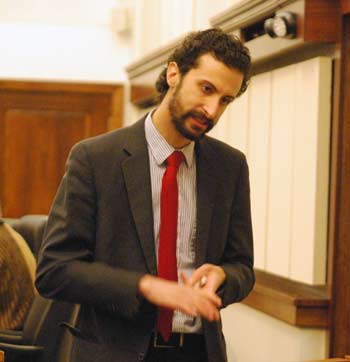
Yousef Rabhi was re-elected as chair of the Washtenaw County board of commissioners at the board’s Jan. 8, 2014 meeting. The following day, he publicly announced his intent not to run for mayor of Ann Arbor this year. (Photos by the writer.)
It’s the next step of several that are required before such a program can be created. The goal of PACE is to help owners of commercial (not residential) properties pay for energy improvements by securing financing from commercial lenders and repaying the loan through voluntary special assessments.
The county’s proposal entails joining the Lean & Green Michigan coalition and contracting with Levin Energy Partners to manage the PACE program.
A public hearing on this issue is set for the board’s meeting on Jan. 22. The board would also need to take another vote to actually create the PACE district. A date for that action has not been set.
Officer elections were also held on Jan. 8. As expected, the board officers who were first elected in January 2013 were re-elected. Yousef Rabhi (D-District 8) will continue to serve as board chair. Also re-elected were Alicia Ping (R-District 3) as vice chair, Felicia Brabec (D-District 4) as chair of the board’s ways & means committee, and Andy LaBarre (D-District 7) as chair of the working sessions. There were no competing nominations and all votes were unanimous, although Rolland Sizemore Jr. (D-District 5) was out of the room when the votes for Brabec and LaBarre were taken.
Regarding revisions to the board’s rules and regulations, corporation counsel Curtis Hedger made four recommended changes, including three that related to voting requirements. The fourth change inserted language to clarify that binding action may not be taken at a board working session.
The Jan. 8 meeting also included a public hearing on a proposed ordinance that would allow the county to issue municipal civil infractions for owning an unlicensed dog. The board had held a previous hearing at its meeting on Oct. 16, 2013, but it occurred after midnight and no one spoke. Some commissioners felt that a second hearing should be scheduled because the initial one was held so late in the evening. One person spoke on Jan. 8, urging the board to create a progressive scale of fees and to provide waivers for low-income families and individuals.
In other feedback from the public, Jim Casha spoke during public commentary to raise concerns over the southeast Michigan Regional Transit Authority (RTA). “It just seems to me that it’s just going to be another waste of time and taxpayers’ money, and just another level of bureaucracy,” he told commissioners. Board chair Yousef Rabhi will be appointing a new Washtenaw County representative to the RTA soon to replace Richard Murphy, who did not seek reappointment. The county’s other board member on the RTA is University of Michigan professor Liz Gerber, whose term runs through 2015.
The extended deadline for applying was Jan. 12, and Casha was one of only two applicants for the RTA opening. As a Canadian resident, he is ineligible to be appointed for the seat to represent Washtenaw County. The other applicant is Alma Wheeler Smith, a former state legislator and the mother of county commissioner Conan Smith (D-District 9).
Officer Elections
The first meeting of each year for the county board is initially chaired by the county clerk, until the board elects its officers for the year. As he has for the past several years, on Jan. 8 the meeting was brought to order by county clerk Larry Kestenbaum. After leading the initial portion of the meeting, Kestenbaum called for nominations for board chair.
Conan Smith (D-District 9) nominated Yousef Rabhi (D-District 8) for re-election as chair. He began by joking that 2013 was “a miserable year. I mean, it had the number 13 in it, and we knew it was going to be bad from the very beginning. And the only way that we were going to get through a year with 13 in it was to have an outstanding, creative chair who brought his own luck with him.”
There were no other nominations.
Outcome: Yousef Rabhi was unanimously re-elected chair on a roll call vote.
After the vote, Smith jokingly complained that the minutes didn’t reflect his rhetoric: “The minutes for this are miserable. ‘C. Smith nominated commissioner Rabhi.’ That’s all it says!”
Kestenbaum then handed over the meeting to Rabhi. As his first act, Rabhi nominated Alicia Ping (R-District 3) for re-election as vice chair.
C. Smith moved a unanimous ballot – a parliamentary procedure to elect the nominee without a roll call vote when there are no competing nominations and no one is expected to vote against the nomination.
Outcome on unanimous ballot: The vote failed 8-1, over dissent from Rolland Sizemore Jr. (D-District 5).
Outcome on roll call vote: Ping was unanimously re-elected vice chair.
Later in the meeting, elections were held for the officers of the board’s standing committees: the ways & means committee, and working sessions.
Ping nominated Felicia Brabec (D-District 4) for re-election as chair of the ways & means committee, on which all commissioners serve. The meetings of this committee are held immediately prior to the regular board meetings, and initial votes are taken at the ways & means meetings.
There were no other nominations. C. Smith again moved a unanimous ballot.
Outcome on unanimous ballot to re-elect Brabec: It was approved on a voice vote. Rolland Sizemore Jr. was not in the room at the time.
Brabec nominated Andy LaBarre (D-District 7) for re-election as chair of the board’s working sessions. There were no other nominations. C. Smith moved a unanimous ballot.
Outcome on unanimous ballot to re-elect LaBarre: It was approved on a voice vote. Rolland Sizemore Jr. was not in the room at the time.
Officer Elections: Compensation
Based on compensation that was approved by the board’s Dec. 2, 2012 meeting, the three chairs – Rabhi, Brabec and LaBarre – will each make a base salary of $18,750. That’s $3,000 more than other commissioners. None of the positions are considered to be full-time jobs.
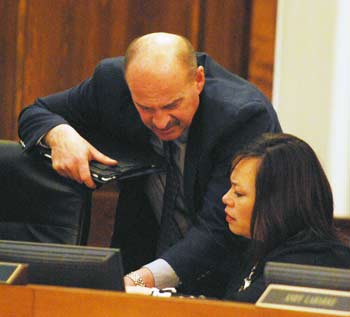
Curt Hedger, the county’s corporation counsel, talks with commissioner Alicia Ping (R-District 3) prior to the start of the Jan. 8, 2014 board meeting. Ping was re-elected vice chair of the board.
Commissioners also receive stipend payments based on the number of meetings that a commissioner is likely to attend for a particular appointment to the other various boards, committees and commissions. One or two meetings per year would pay $50, three or four meetings would pay $100, and the amounts increase based on the number of meetings. Each commissioner typically has several appointments. Commissioners who are appointed as alternates receive the same stipend as the regular appointments. Some appointments were not designated to be paid because no meetings were expected to be scheduled.
Commissioners can waive their stipends by giving written notice to the county clerk. Otherwise, the stipend payments are made automatically.
In 2013, only Dan Smith (R-District 2) waived all of his stipends, according to the county clerk’s office, which administers the stipends. Brabec waived her stipend for the accommodations ordinance commission. Ronnie Peterson (D-District 6) was not appointed to any boards, committees or commissions and therefore did not receive any stipends.
For 2013, the following stipends were paid [.pdf of chart indicating appointments and eligible stipends]:
- Yousef Rabhi (D-District 8): $2,700 (11 paid appointments, including several stipulated by virtue of Rabhi’s position as board chair, plus 3 unpaid appointments)
- Rolland Sizemore Jr. (D-District 5): $2,350 (11 paid, 2 paid alternates, 1 unpaid)
- Conan Smith (D-District 9): $1,800 (6 paid, 2 paid alternates, 1 unpaid)
- Felicia Brabec (D-District 4): $1,450 (8 paid, 1 alternate with stipend waived)
- Kent Martinez-Kratz (D-District 1): $800 (4 paid)
- Andy LaBarre (D-District 7): $550 (3 paid, 1 unpaid)
- Alicia Ping (R-District 3): $400 (2 paid, 2 unpaid)
In total, seven commissioners were paid $10,050 in stipends for 2013. There is no mechanism in place for validating attendance, other than checking the meeting minutes of these various groups. No one is designated to do that, however.
The board appointments and stipends for 2014 haven’t yet been set. That will likely happen at an appointments caucus that is expected to be scheduled for later this month or early February.
Rules & Regulations
Revisions to the board’s rules and regulations, which are approved and updated annually, were recommended by corporation counsel Curtis Hedger. Three changes related to voting requirements. The fourth change inserted language to clarify that binding action may not be taken at a board working session. [.pdf of draft rules & regulations, with changes indicated in bold and strike-through] [.pdf of Hedger's staff memo]
At the Jan. 8 meeting, Hedger told commissioners that the most significant change related to taking a final vote on the same day that a resolution is initially introduced. [bold indicates added text, strike-through indicates deletion]:
III. CONDUCT
…
T. FINAL ACTION ON DAY OF INTRODUCTION:No resolution or proceeding of the Board of Commissioners imposing taxes or assessments, or requiring the payment, expenditure or disposition of money or property, or creating a debt or liability therefore, shall be allowed on the same day as introduced, unless approved by a vote of two-thirds (2/3) a majority of the members elected and serving.
In the past, Hedger noted, the rules called for two-thirds of the board’s members to move a resolution for a final vote at a board meeting, if it was initially introduced at the ways & means committee meeting that same night. Even though the board’s two-thirds rule “had been there forever,” Hedger said, “it was brought to my attention that under Michigan law, we can’t do that.” Specifically, MCL 46.3 states:
(2) The county board of commissioners of a county shall act by the votes of a majority of the members present. However, the final passage or adoption of a measure or resolution or the allowance of a claim against the county shall be determined by a majority of the members elected and serving. …
Hedger reported that he had canvassed staff at other counties and they told him that the county boards follow that rule. So by passing this revision to the Washtenaw County board rules, it would bring them into compliance with Michigan law, he said.
The other suggested revisions are technical changes, Hedger said. One change is to clarify actions that require a “higher majority” vote in order to pass [added text in bold]:
O. VOTING:
Every member who shall be present, including the Chair, when a motion is last stated by the Chair, and no other, shall vote for or against the motion unless the member has a conflict of interest, in which case the member shall not vote.
…2. Votes Required:
Procedural and other questions arising at a meeting of the Commissioners, except for those decisions required by statute or by these rules (Specifically, Rule II F—Closing Debate in Committees and Rule III R—Suspension/ Amendment or Rescission of Board Rules) to have a higher majority, shall be decided by a majority of the members present. A majority of the members elected and serving, however, shall be required for the final passage or adoption of a motion, resolution or allowance of a claim.
Another proposed change was to standardize the phrase “elected and serving,” to be consistent with other references in the board rules [added text in bold]:
R. SUSPENSION:
No rule of the Board shall be suspended without the concurrence of two-thirds (2/3) of the members elected and serving. To amend or rescind a rule will require two-thirds (2/3) of members elected and serving unless specific notice was given at previous meeting, whereupon a majority of members elected and serving may amend or rescind.
The final proposed revision involved working sessions. Hedger said he changed the rules to make it more precise about what a working session is. It clarifies what the board already does, he said. [bold indicates added text, strike-through indicates deletion]:
XI. WORKING SESSION PROCEDURES
The purpose of the Working Session shall be to permit in-depth, informal discussion of Commissioner concerns, Board goals, significant programmatic and financial issues, and conceptual and informational presentations by the County Administrator. All matters involving major change in service delivery, staffing or funding, or any modification in Board of Commissioner policy shall originate at the Working Session. Status reports from advisory committees and departmental informational reports shall be presented at Working Session. The Working Sessions of the Board of Commissioners are not to be considered an official public meeting of the Board of Commissioners. The Working Sessions are noticed as a public meeting to comply with the Open Meetings Act because a quorum of the Board of Commissioners may be present at the meeting. It is intended that Formal votes indicating Commissioner support or opposition to agenda items shall not be taken at Working Session meetings. The Chair may take an informal poll of the board members present to assist in determining whether the Commissioners desire more information or discussion regarding an item or whether the Commissioners are prepared to take action on an item at a meeting of the Ways and Means Committee or at the regular session. Agendas shall be set in advance; however, Commissioners shall have the opportunity to introduce issues during the meeting for future Working Session consideration.
Rules & Regulations: Board Discussion
Conan Smith (D-District 9) asked whether MCL 46.3 actually requires a two-thirds majority vote for non-agenda items. Smith was referring to this section [emphasis added]:
(2) … The county board of commissioners may require in its bylaws that the votes of 2/3 of the members present or a majority of the members elected and serving, whichever is greater, are required on final passage or adoption of a nonagenda item. The voting requirements of this subsection do not apply if section 11 or any other provision of law imposes a higher voting requirement.
The short answer is no, Hedger replied. Smith said his concern is that there are often items that aren’t on the published agenda, but that are brought forward at the ways & means committee meeting. He clarified with Hedger that if items are moved as part of the agenda during the meeting, then those items are considered agenda items.
Hedger also pointed out that the law states the board “may require,” not “shall require.” So it’s at the board’s discretion.
Dan Smith (R-District 2) said he wasn’t particularly thrilled with the removal of the two-thirds majority rule, but added that he couldn’t argue with Hedger’s reasoning. He said he had reviewed all the changes in great detail, and had “kicked several of these things back and forth” with Hedger. Smith concluded that he was satisfied with the proposed changes.
Outcome: The revised rules and regulations were approved unanimously.
PACE Program
Commissioners were asked to give final approval to a notice of intent to form a Property Assessed Clean Energy (PACE) program.
An initial vote had been taken on Dec. 4, 2013, following about an hour of debate. There was no discussion on Jan. 8.
The goal of PACE is to help owners of commercial (not residential) properties pay for energy improvements by securing financing from commercial lenders and repaying the loan through voluntary special assessments.
The county’s proposal entails joining the Lean & Green Michigan coalition and contracting with Levin Energy Partners to manage the PACE program. Andy Levin, who’s spearheading the PACE program statewide through Lean & Green, attended the Dec. 4 meeting to answer questions. State Sen. Rebekah Warren also spoke briefly during public commentary on Dec. 4 to support the initiative. She was instrumental in passing the state enabling legislation to allow such programs in Michigan.
The law firm of Miller, Canfield, Paddock & Stone would act as legal counsel. Several other counties are part of Lean & Green, according to the group’s website. Other partners listed on the site include the Southeast Michigan Regional Energy Office, which was co-founded by county commissioner Conan Smith. Smith is married to Warren.
The county’s PACE program would differ from the one set up by the city of Ann Arbor, which created a loan loss pool to reduce interest rates for participating property owners by covering a portion of delinquent or defaulted payments. Washtenaw County does not plan to set up its own loan loss reserve, and no county funds would be used for the program, according to Levin.
However, a reserve fund is mentioned in documentation that describes the program:
8. Reserve Fund
In the event Washtenaw County decides to issue bonds to provide financing for a PACE Program, Washtenaw County can determine at that time to fund a bond reserve account from any legally available funds, including funds from the proceeds of bonds.
By participating in LAGM [Lean & Green Michigan], Washtenaw County assists its constituent property owners in taking advantage of any and all appropriate loan loss reserve and gap financing programs of the Michigan Economic Development Corporation (“MEDC”). Such financing mechanism can similarly be used to finance a reserve fund.
[.pdf of PACE program documentation] [.pdf of PACE cover memo] [.pdf PACE resolution]
On Dec. 4, the board set a public hearing on this issue for the meeting on Jan. 22, 2014. The board would also need to take another vote to actually create the PACE district. A date for that action has not been set.
Outcome: A final vote to issue a notice of intent to create a PACE program was passed unanimously. Rolland Sizemore Jr. was out of the room when the vote was taken.
Dog Licensing Public Hearing
The board held a public hearing on a proposed ordinance that would allow the county to issue municipal civil infractions for owning an unlicensed dog.
The proposal would also establish that the county treasurer’s office would be the bureau for administering these infractions, and would set new licensing fees. [.pdf of proposed dog license ordinance]
One person, Thomas Partridge, spoke during the public hearing. He didn’t think the ordinance went far enough to protect all animals, especially during severe weather. He said that low-income families who want to have pets for their children will be challenged to pay license fees and the inoculations that would be required in order to get a license. He called for the board to create a progressive scale for fees and to provide waivers for low-income families and individuals.
The board had held a previous hearing at its meeting on Oct. 16, 2013, but it occurred after midnight and no one spoke. Some commissioners felt that there should be another opportunity for formal public input, so that’s why another public hearing was scheduled for Jan. 8.
More than a year ago, at the county board’s Nov. 7, 2012 meeting, commissioners approved a civil infractions ordinance that gave the county more flexibility to designate violations of other county ordinances as a civil infraction, rather than a criminal misdemeanor. For example, enforcement of the county’s dog licensing ordinance is low because the current penalty – a criminal misdemeanor of 90 days in jail or a $500 fine – is relatively harsh. The idea is that enforcement would improve if a lesser civil infraction could be used. The civil infraction fines are $50 for a first offense, $100 for a second offense, and $500 for a third or any subsequent offense.
An increase in the enforcement is expected to result in an increase in the number of dog licenses, which would provide additional revenue to be used for animal control services.
However, the county board hasn’t yet taken the additional step of authorizing the issuance of a civil infractions for owning an unlicensed dog. There was no agenda item put forward for a vote on this issue at the Jan. 8 meeting, nor was there any resolution on the agenda regarding a new fee structure for dog licenses.
A draft resolution and staff memo had been prepared in November 2013 but never brought forward to the board for a vote. [.pdf of November 2013 staff memo and resolution] The county treasurer’s office is proposing to lower the current dog licensing fee from $12 to $6 per year for spayed or neutered dogs and from $24 to $12 per year for dogs that aren’t spayed or neutered. There would continue to be a discount for a three-year license. More information about current dog licenses is available on the county website.
In addition, the draft memo provided a list of fees for violating the dog license ordinance: $50 (first offense); $100 (second offense); and $500 (third and subsequent offenses).
County treasurer Catherine McClary attended the Jan. 8 meeting but did not formally address the board.
Outcome: This was not a voting item.
Communications & Commentary
During the meeting there were multiple opportunities for communications from the administration and commissioners, as well as public commentary. In addition to issues reported earlier in this article, here are some other highlights.
Communications & Commentary: Regional Transit Authority
Jim Casha introduced himself as a resident of Ontario, Canada, who was born and raised in Detroit. He was there to ask for the board’s help with the southeast Michigan Regional Transit Authority (RTA).
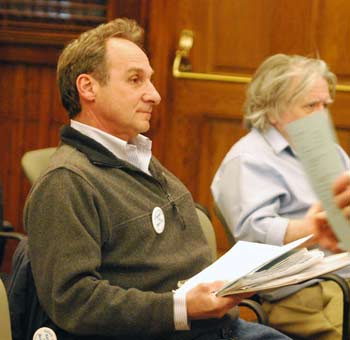
Jim Casha spoke during public commentary about the southeast Michigan regional transit authority (RTA).
Casha told commissioners that he’d been a student at the University of Detroit and had worked at the Southeast Michigan Council of Governments (SEMOG). After that, he got out of planning and into the construction of transit systems, including subways.
He was concerned that the decisions of the RTA board aren’t in the best interest of building a regional transit system. “It just seems to me that it’s just going to be another waste of time and taxpayers’ money, and just another level of bureaucracy,” he said.
Casha said he’s made two suggestions to the board. The first was to acquire the 157-acre Michigan state fairgrounds property, as a way of generating revenue. It’s a logical place for a regional transportation hub, he said. The rail link from Chicago through Ann Arbor to Detroit already runs past the east side of the property, and it’s near 8 Mile and Woodward. It’s a very valuable piece of land, and the RTA could use it to generate millions of dollars through long-term leasing.
He noted that the state is planning to give away the land to private developers, but he argued that this is not the right time to do that. A group of citizens has been working on an alternative approach to create a truly public-private partnership that generates money for the public, he said, not just for private individuals. He said he’d made these comments to the RTA board, “but I really just don’t think they’re listening.”
Casha also objected to the selection of John Hertel over Larry Salci as the RTA’s CEO. Salci was the former director of the southeast Michigan transportation authority in the 1970s, he said, and had prepared a regional transportation plan with federal funding lined up at that time. Only one member of the current RTA board supported Salci, Casha noted, although the two RTA board representatives from Washtenaw County – Liz Gerber and Richard Murphy – had supported Salci initially.
The three-minute time limit for public commentary elapsed before Casha finished his remarks. He also provided written handouts to the board. [.pdf of Casha's commentary to RTA board in March 2013] [.pdf of Casha's commentary to RTA board in April 2013]
Commissioner Response to Public Commentary – RTA
Yousef Rabhi (D-District 8) thanked Casha for his commentary, saying that the point about finding a use for the state fairgrounds that helps the public over private interests really resonated with him. The land should be kept for public purposes, and he appreciated Casha’s advocacy on that.
By way of background, the RTA was established by the state legislature in late 2012 during its lame duck session. It includes a four-county region – Macomb, Oakland, Washtenaw and Wayne – with each county making two appointments to the board, and the city of Detroit making one.
The county board chair appoints both of Washtenaw County’s members to the RTA board. Those appointments were first made at the end of 2012 by Conan Smith (D-District 9), who was chair through the end of that year. Liz Gerber, a University of Michigan professor of public policy, was appointed to a three-year term. Richard Murphy, who works for Smith at the Michigan Suburbs Alliance, was appointed to a one-year term, and is not seeking reappointment.
The deadline to apply had been extended to Jan. 12, but only two applications were received – from Casha and former state legislator Alma Wheeler Smith, who is Conan Smith’s mother. The RTA state enabling legislation (Act 387 of 2012) mandates that board members must be residents of the county or city that they represent. So as a Canadian resident, Casha is ineligible for the appointment. [.pdf of application materials]
Communications & Commentary: Appointments
Later in the meeting, Yousef Rabhi noted that in addition to an opening for the southeast Michigan Regional Transit Authority (RTA), there are also openings for the Washtenaw County food policy council and the Washtenaw County parks & recreation commission.
The deadline to apply had been extended to Jan. 12. Rabhi noted that nominations will be made at the board’s next meeting on Jan. 22. Commissioners will receive applications for review before that.
Communications & Commentary: Shelter for the Homeless
During the time for public commentary, Tom Partridge called on the board to redouble efforts to help people in need, especially during the very dire weather conditions experienced recently. He asked them to shift funding and provide emergency relief to homeless residents, including food and transportation.
There’s also need on a continuing basis to eliminate homelessness, build affordable housing, and provide affordable public transportation and health care, Partridge said.
Yousef Rabhi (D-District 8) gave an update on the county’s response to providing shelter for the homeless during the recent winter storm and sub-zero temperatures. He said he knew that the Ann Arbor city council had some dialogue about it and heard from residents during the Jan. 6 council meeting. People are not being turned away from the Delonis Center, a homeless shelter, he said. The shelter has even relaxed some of its intoxication rules to allow people to stay there who might otherwise not be permitted, Rabhi noted.
There are some people who aren’t allowed to stay at the shelter because of previous incidents, Rabhi reported. The county’s PORT (the county’s project outreach team) has been reaching out to them, he said, to make sure they have accommodations or supplies like sleeping bags. There’s always more that could be done, Rabhi said, but there is collaboration among many entities, including the local governments, the Red Cross, and others.
Communications & Commentary: Food Policy Council
Yousef Rabhi described some of the initiatives that the Washtenaw County food policy council is working on, including a proposal for a county procurement policy that would be more environmentally responsible. In addition, the food policy council working in collaboration with the county’s office of community and economic development to emphasize using local sources in government procurement. Formal proposals will likely come to the board – possibly this spring, he said.
Communications & Commentary: Teens For Tomorrow Art Contest
During her report to the board, county administrator Verna McDaniel highlighted the recent Teens for Tomorrow art contest. She thanked Yousef Rabhi for attending, and thanked Rolland Sizemore Jr. for his advocacy of programs for county youth.
Present: Felicia Brabec, Andy LaBarre, Kent Martinez-Kratz, Ronnie Peterson, Alicia Ping, Yousef Rabhi, Rolland Sizemore Jr., Conan Smith, Dan Smith.
Next regular board meeting: Wednesday, Jan. 22, 2014 at 6:30 p.m. at the county administration building, 220 N. Main St. in Ann Arbor. The ways & means committee meets first, followed immediately by the regular board meeting. [Check Chronicle event listings to confirm date.] (Though the agenda states that the regular board meeting begins at 6:45 p.m., it usually starts much later – times vary depending on what’s on the agenda.) Public commentary is held at the beginning of each meeting, and no advance sign-up is required.
The Chronicle could not survive without regular voluntary subscriptions to support our coverage of public bodies like the Washtenaw County board of commissioners. Click this link for details: Subscribe to The Chronicle. And if you’re already supporting us, please encourage your friends, neighbors and colleagues to help support The Chronicle, too!




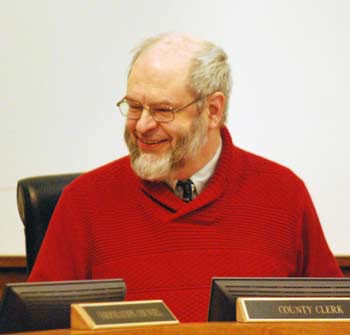
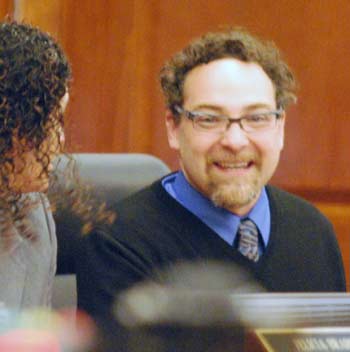
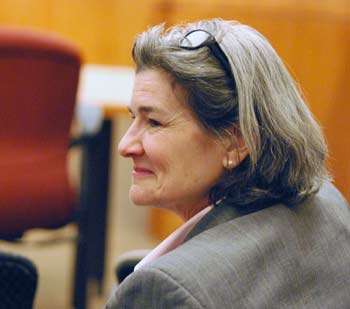
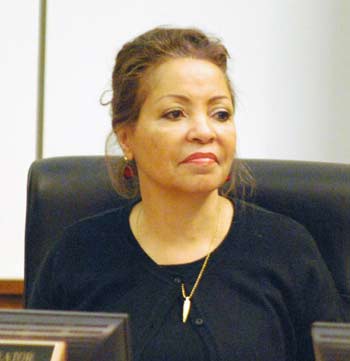
Related to the RTA, the Detroit Free Press has reported that John Hertel, the RTA’s CEO, is expected to announce his resignation today and return to his previous position at the Suburban Mobility Authority for Regional Transportation (SMART), which provides public transit for metro Detroit. [link]
With no dedicated funding and no authority over either SMART
… or DDOT, RTA does seem like a waste of time. I’m not surprised no one wants to be on the board and the CEO quit.
I think the point was more that Hertel was not able to wangle some funding out of the legislature for salaries. Not true that RTA has no authority over SMART or DDOT. They can review plans and have some say so over Fed funding. But without operating funds, RTA is in a tough spot. They’ll have to persuade a 4-county area to pass a millage or other funding mechanism.
Just to say that our Washtenaw County reps have been doing an excellent job. I was reading minutes (see SEMCOG host site) and Liz Garber helped save the AAATA from some slices on their Fed funding by pointing out a very technical issue on district allocations.
(6) A board member shall have substantial business, financial, or professional experience relevant to the operation of a corporation or public transportation system.
While I might not be qualified to be Washtenaw County’s RTA representative because I do not live in the county, it would appear from Alma’s resume, and the above legislative requirement,that she doesn’t either. We just got rid of one politician (John Hertel)why do you want to bring in another one? Where are all the transit people in Washtenaw? Why wouldn’t Conan and the Michigan Suburbs Alliance return my calls and/or do something about the Fairgrounds? Their office is just down the street in Ferndale! Why wouldn’t Conan’s wife, Sen. Rebekah Warren, talk to me the RTA and the Fairgrounds???? What is their real agenda?? It doesn’t appear to be getting a regional transportation system and protecting the people’s assets.
Hello Alma. Long time no see. I’m still in Lansing (though I would rather be in Canada) trying to get help for MI’s foster kids affected by prenatal alcohol exposure. You know, the ones you wouldn’t help.
“The RTA state enabling legislation (Act 387 of 2012) mandates that board members must be residents of the county or city that they represent”
IS Alma Wheeler Smith a resident of Washtenaw County? That should be a pretty simple question to answer.
Re. “IS Alma Wheeler Smith a resident of Washtenaw County?”
According to Washtenaw County property records, her home is located in Salem Township, with a South Lyon mailing address.
Thanks for the verification.
#5: someone wouldn’t return your calls? Imagine that.
Rod, I don’t know the facts of the case (#5) but I’ll point out that all the individuals named were either elected officials or semipublic agency staff. They are supposed to respond to public inquiries. Be Generous.
I hear you, but I also hear the hectoring, suspicious, accusatory tone. Even a dutiful public servant must experience moments of aversion now and then.